Related Research Articles

High Noon is a 1952 American Western film produced by Stanley Kramer from a screenplay by Carl Foreman, directed by Fred Zinnemann, and starring Gary Cooper. The plot, which occurs in real time, centers on a town marshal whose sense of duty is tested when he must decide to either face a gang of killers alone, or leave town with his new wife.
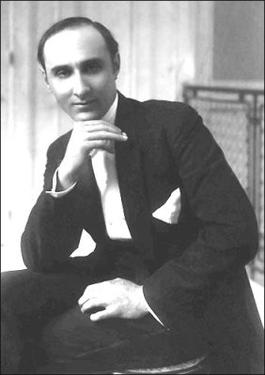
Dimitri Zinovievich Tiomkin was a Russian and American film composer and conductor. Classically trained in Saint Petersburg before the Bolshevik Revolution, he moved to Berlin and then New York City after the Russian Revolution. In 1929, after the stock market crash, he moved to Hollywood, where he became best known for his scores for Western films, including Duel in the Sun, Red River, High Noon, The Big Sky, Gunfight at the O.K. Corral, Rio Bravo, and Last Train from Gun Hill.
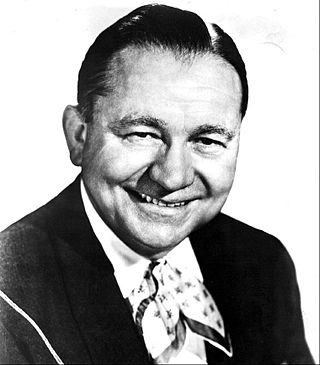
Woodward Maurice "Tex" Ritter was a pioneer of American Country music, a popular singer and actor from the mid-1930s into the 1960s, and the patriarch of the Ritter acting family. He is a member of the Country Music Hall of Fame.
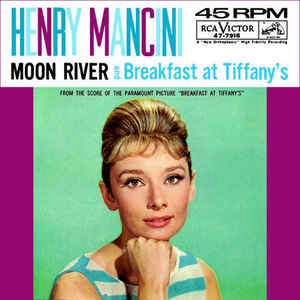
"Moon River" is a song composed by Henry Mancini with lyrics by Johnny Mercer. It was originally performed by Audrey Hepburn in the 1961 film Breakfast at Tiffany's, winning an Academy Award for Best Original Song. The song also won the 1962 Grammy Awards for Record of the Year and Song of the Year. In 1999, Mancini's recording was inducted into the Grammy Hall of Fame.

James Edward Ingram was an American singer, songwriter and record producer. He was a two-time Grammy Award-winner and a two-time Academy Award nominee for Best Original Song. After beginning his career in 1973, Ingram charted eight top 40 hits on the U.S. Billboard Hot 100 chart from the early 1980s until the early 1990s, as well as thirteen top 40 hits on the Hot R&B/Hip-Hop Songs chart. In addition, he charted 20 hits on the Adult Contemporary chart. He had two number-one singles on the Hot 100: the first, a duet with fellow R&B artist Patti Austin, 1982's "Baby, Come to Me" topped the U.S. pop chart in 1983; "I Don't Have the Heart", which became his second number-one in 1990 was his only number-one as a solo artist.

Ned Washington was an American lyricist born in Scranton, Pennsylvania.

"Nobody Does It Better" is a power ballad and the theme song for the James Bond film The Spy Who Loved Me (1977). Composed by Marvin Hamlisch with lyrics by Carole Bayer Sager, the song was produced by Richard Perry and performed by Carly Simon. It was the first Bond theme song to be titled differently from the name of the film since Dr. No (1962), although the phrase "the spy who loved me" is included in the lyrics. The song was released as a single from the film's soundtrack album, and became a major worldwide hit.
"Zing a Little Zong" is a popular song written by Harry Warren, the lyrics by Leo Robin. The song was published in 1952 and written for the 1952 movie Just for You where it was performed by Bing Crosby and Jane Wyman. It was nominated for the Academy Award for Best Original Song of 1952 but lost out to "High Noon".
The Decca record by Crosby and Wyman was cut on May 8, 1952 and was in the Billboard charts for six weeks with a peak position of #18.

A singing cowboy was a subtype of the archetypal cowboy hero of early Western films. It references real-world campfire side ballads in the American frontier. The original cowboys sang of life on the trail with all the challenges, hardships, and dangers encountered while pushing cattle for miles up the trails and across the prairies. This continues with modern vaquero traditions and within the genre of Western music, and its related New Mexico, Red Dirt, Tejano, and Texas country music styles. A number of songs have been written and made famous by groups like the Sons of the Pioneers and Riders in the Sky and individual performers such as Marty Robbins, Gene Autry, Roy Rogers, Tex Ritter, Bob Baker and other "singing cowboys". Singing in the wrangler style, these entertainers have served to preserve the cowboy as a unique American hero.
"Don't Fence Me In" is a popular American song written in 1934, with music by Cole Porter and lyrics by Robert Fletcher and Cole Porter. Members of the Western Writers of America chose it as one of the Top 100 Western songs of all time.
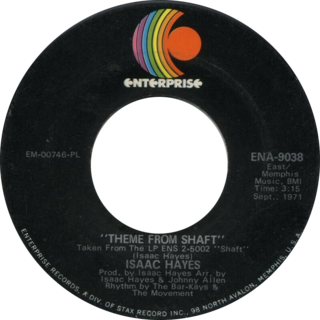
"Theme from Shaft", written and recorded by Isaac Hayes in 1971, is the soul and funk-styled theme song to the Metro-Goldwyn-Mayer film Shaft. The theme was released as a single two months after the movie's soundtrack by Stax Records' Enterprise label. "Theme from Shaft" went to number two on the Billboard Soul Singles chart and to number one on the Billboard Hot 100 in the United States in November 1971, and number one in Canada in December. The song was also well received by adult audiences, reaching number six on Billboard's Easy Listening chart and number four in Canada. The song is considered by some to be one of the first disco songs.
"Love in Bloom" is a popular song with music by Ralph Rainger and lyrics by Leo Robin, published in 1934. It was introduced in the film She Loves Me Not by Bing Crosby and Kitty Carlisle. It remained familiar for many years thereafter as the theme song of Jack Benny, played at the opening and closing of his radio and television programs.

"Love Theme from The Godfather" is an instrumental theme from the 1972 film The Godfather, composed by Nino Rota. The piece was lyricized in English by Larry Kusik into "Speak Softly, Love", a popular song released in 1972. The highest-charting rendition of either version was by vocalist Andy Williams, who took "Speak Softly Love" to number 34 on Billboard magazine's Hot 100 and number seven on its Easy Listening chart.
"The Hanging Tree" is a western ballad from the 1959 movie The Hanging Tree. It was scored by Max Steiner and written by Mack David and Jerry Livingston, who received nominations for the Laurel Awards and the Academy Awards in 1960. The text is a short reference to the film's story.
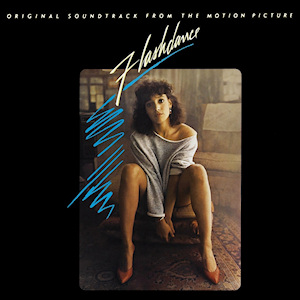
Flashdance: Original Soundtrack from the Motion Picture is the soundtrack to the 1983 film Flashdance, which tells the story of Alex Owens, a welder and exotic dancer who dreams of becoming a professional ballerina. The nightclub performances by Alex and her co-workers and other set pieces involving training and auditioning provided opportunities to present the songs that would make up the soundtrack album. The film's music supervisor, Phil Ramone, made selections that he felt were the best fit for their respective scenes, and composer Giorgio Moroder contributed additional tracks in the process of scoring the film. One of his contributions, "Flashdance...What a Feeling" by Irene Cara, was released as a single in March 1983, weeks before the film's April 15 release, and eventually spent six weeks at number one on the Billboard Hot 100. The soundtrack was released on April 11, 1983 by Casablanca Records.
"Down in the Valley", also known as "Birmingham Jail", is a traditional American folk song. It has been recorded by many artists and is included in the Songs of Expanding America recordings in Burl Ives' six-album set Historical America in Song.

"I'm an Old Cowhand (From the Rio Grande)" is a comic song written by Johnny Mercer for the Paramount Pictures release Rhythm on the Range and sung by its star, Bing Crosby. The Crosby commercial recording was made on July 17, 1936, with Jimmy Dorsey & his Orchestra for Decca Records. It was a huge hit in 1936, reaching the No. 2 spot in the charts of the day, and it greatly furthered Mercer's career. Crosby recorded the song again in 1954 for his album Bing: A Musical Autobiography.
Members of the Western Writers of America chose it as one of the Top 100 Western songs of all time. It has also been covered by numerous jazz musicians, including Sonny Rollins, Monty Alexander, Joshua Redman, and John Scofield.
"The Cattle Call" is a song written and recorded in 1934 by American songwriter and musician Tex Owens. The melody was adapted from Bruno Rudzinksi's 1928 recording "Pawel Walc". It later became a signature song for Eddy Arnold. Members of the Western Writers of America chose it as one of the Top 100 Western songs of all time.
"Because You're Mine" is a song written by Nicholas Brodszky with lyrics by Sammy Cahn taken from the 1952 musical film of the same title. It was recorded by Mario Lanza and Nat King Cole in two different versions, which were both released as singles in 1952. In the US, Lanza's record reached No. 7 in the Billboard charts and Nat King Cole's version achieved the No. 16 position. The Mario Lanza recording also reached No. 3 in the UK Singles Chart, spending 24 weeks within the top 12, and was Lanza's only UK Top 12 hit. The Nat King Cole recording was included on his album Top Pops, placed three spots lower and spent three weeks on the chart. The Mario Lanza recording was one of his three million-selling singles.
"Through the Eyes of Love ", is an Academy Award and Golden Globe Award-nominated ballad performed by American singer Melissa Manchester, from the soundtrack of the 1978 film Ice Castles.
References
- 1 2 3 Roberts, David (2006). British Hit Singles & Albums (19th ed.). London: Guinness World Records Limited. p. 134. ISBN 1-904994-10-5.
- ↑ The Making of High Noon, hosted by Leonard Maltin, 1992, interview with John Ritter. Available on blu-Ray from Olive Films.
- ↑ Liner notes, "High Noon" soundtrack, Screen Archives Entertainment, 2013.
- ↑ Western Writers of America (2010). "The Top 100 Western Songs". American Cowboy. Archived from the original on 19 October 2010.
- ↑ "Wes Anderson's Asteroid City Soundtrack Out from ABKCO Digitally Today". Focus Features. 23 June 2023.
- ↑ Whitburn, Joel (1986). Joel Whitburn's Pop Memories 1890-1954 . Menomonee Falls, Wisconsin: Record Research Inc. p. 370. ISBN 0-89820-083-0.